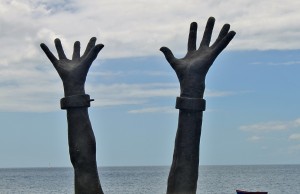
The upcoming movie Exodus: Gods and Kings tells the story of the calling of Moses, by God, to deliver the Israelites out of the land where they are enslaved. The trailer depicts Ramses, Moses’ opposition, emphatically proclaiming, “I am god. I am a god.”
His assertion is symbolic.–The 2014 Global Slavery Index estimates that 35.8 million men, women and children are enslaved. According to the report, modern forms of slavery include human trafficking for commercial sex, forced labour, debt bondage, forced or servile marriage, and the sale and exploitation of children. Worldwide profits from the use of (non-state) forced labour is estimated at $150.2 billion U.S. dollars per year.–If we examine the corrupt systems of the world that perpetuate modern day slavery, we will undoubtedly find lesser gods at play, thriving in our broken and disconnected humanity.
The sins of brothel owners and slave traders may seem obvious to us. They trick the weak and vulnerable, poor and often uneducated, into bondage. Perhaps they are provoked to their cruelty by greed or selfishness. And perhaps underlying that is their own economic insecurity: they rely on the gods of deceit and power to make their way in life, at the expense of those weaker than they are.
But more subtle forms of complicity can be difficult to identify. For example, Siddharth Kara’s book Bonded Labor: Tackling the System of Slavery in South Asia, traces products of slavery to the supply chains of western consumers. Unexamined acceptance of the objectification of women and the commodification of women’s (and children’s and mens’) bodies undergirds demand for commercial sex acts.–Weaved into our culture, the idols of lifestyle, status, wealth, power and lust promise varying degrees of security and satisfaction, but they only leave us (at least spiritually) and others enslaved.
Fortunately, the Bible tells us that God hears the cries of the oppressed, and Jesus came to set us free.
“The Spirit of the Lord is on me, because he has anointed me to proclaim good news to the poor. He has sent me to proclaim freedom for the prisoners and recovery of sight for the blind, to set the oppressed free, to proclaim the year of the Lord’s favor.” (Luke 4:18-19)
However, there is a cost to challenging the gods and their (human) kings. Economic matters are gospel matters. There can be no spiritual liberation without economic consequences. In the book of Acts, we see two examples of this.
First, in Acts 16:16-24, Paul and Silas help free a slave girl who had “brought her owners a great deal of money.” In the name of Jesus, they were challenging a profitable business to bring freedom to someone whose sex, economic status and age made her vulnerable to abuse.
Then, in Acts 19:24-29, we see Demetrius, a silversmith who makes shrines to the idol Artemis. He gathers together other artisans who make their money from selling shrines to incite a riot, attempting to drive the apostle Paul and his companions away. Demetrius recognized that if people began following Jesus, their patterns of consumption would change.
As Christians, we might ask how we may be buying our own Artemis shrines by pursuing or accepting lesser gods. It may involve questioning the systems we take for granted. It may mean confronting our own demons. There may be practical, economic consequences if we pursue Jesus down this path. But there is also healing, life and freedom on this path. Jesus promises, “The thief comes only to steal and kill and destroy. I came that they may have life and have it abundantly.” (John 10:10)
In honor of the International Day for the Abolition of Slavery (December 2) this week, pray and ask God if there is a first step you can take toward freedom–for yourself and others. First steps can include: praying; finding more information about modern day slavery; giving to an organization that helps victims; advocating for better criminal justice systems; or demanding accountability from businesses.
For some thoughts about how to equip yourself spiritually for the journey, you can also check out Bethany Hoang’s Deepening the Soul for Justice.
For further study on Act 16:16-24 and Acts 19:24-29, see the Theology of Work Bible Commentary for free online.












